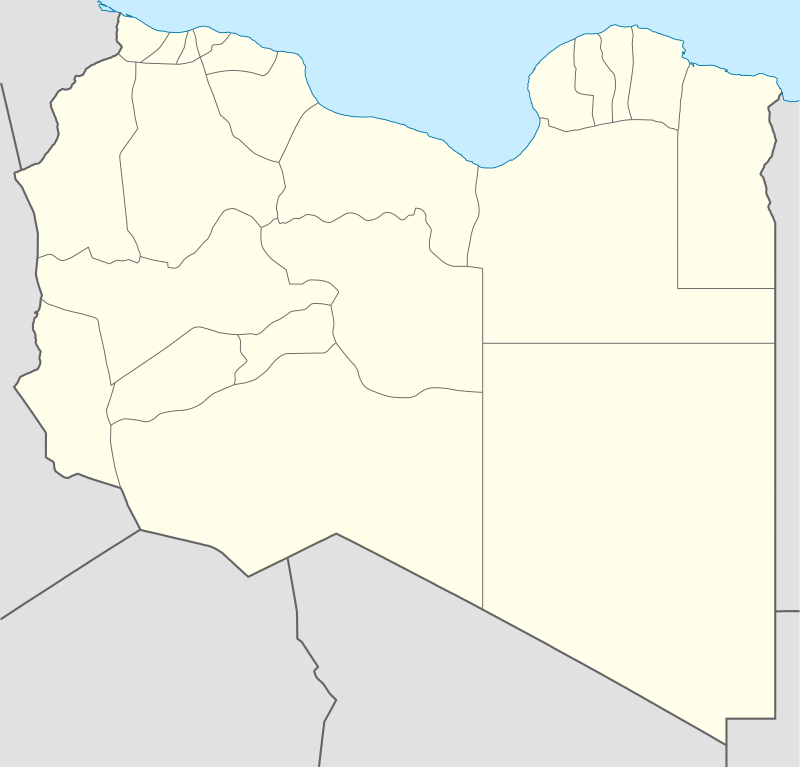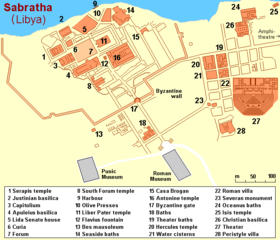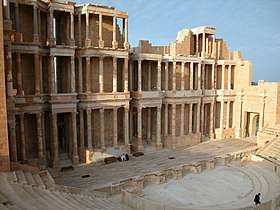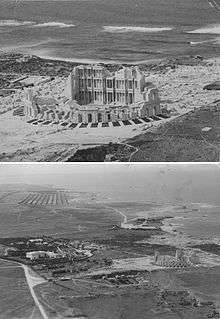Sabratha
| Sabratha صبراتة | |
|---|---|
| Sabratha or Subrata | |
 Theatre of Sabratha | |
 Sabratha Location in Libya | |
| Coordinates: 32°47′32″N 12°29′3″E / 32.79222°N 12.48417°E | |
| Country | Libya |
| Region | Tripolitania |
| District | Zawiya |
| Elevation[1] | 30 ft (10 m) |
| Population (2004)[1] | |
| • Total | 102,038 |
| Time zone | UTC+2 (EET) |
| Website | sabratha.gov.ly |
| UNESCO World Heritage site | |
| Official name | Archaeological Site of Sabratha |
| Includes | Theatre at Sabratha |
| Criteria | Cultural: (iii) |
| Reference | 184 |
| Inscription | 1982 (6th Session) |
| Endangered | 2016–... |

Sabratha, Sabratah or Siburata (Arabic: صبراتة), in the Zawiya District[2] of Libya, was the westernmost of the ancient "three cities" of Roman Tripolis. From 2001 to 2007 it was the capital of the former Sabratha wa Sorman District. It lies on the Mediterranean coast about 70 km (43 mi) west of modern Tripoli.[3] The extant archaeological site was inscribed as a UNESCO World Heritage Site in 1982.
Ancient Sabratha
Sabratha's port was established, perhaps about 500 BC, as a Phoenician trading-post that served as a coastal outlet for the products of the African hinterland. The Phoenicians gave it the Lybico-Berber name 'Sbrt'n',[4] which suggests that there may have been a native settlement built there prior to the Phoenicians' arrival. Sabratha became part of the short-lived Numidian Kingdom of Massinissa before being Romanized and rebuilt in the 2nd and 3rd centuries AD. The Emperor Septimius Severus was born nearby in Leptis Magna, and Sabratha reached its monumental peak during the rule of the Severans. The city was badly damaged by earthquakes during the 4th century, particularly the quake of AD 365. It was rebuilt on a more modest scale by Byzantine governors. The town was site of a bishopric.[5] Within a hundred years of the Arab conquest of the Maghreb, trade had shifted to other ports and Sabratha dwindled to a village.
The archaeological site

Besides its Theatre at Sabratha that retains its three-storey architectural backdrop, Sabratha has temples dedicated to Liber Pater, Serapis and Isis. There is a Christian basilica of the time of Justinian and also remnants of some of the mosaic floors that enriched elite dwellings of Roman North Africa (for example, at the Villa Sileen, near Khoms). However, these are most clearly preserved in the coloured patterns of the seaward (or Forum) baths, directly overlooking the shore, and in the black and white floors of the Theatre baths.
There is an adjacent museum containing some treasures from Sabratha, but others can be seen in the national museum in Tripoli.
In 1943, during the Second World War, archaeologist Max Mallowan, husband of novelist Agatha Christie, was based at Sabratha as an assistant to the Senior Civil Affairs Officer of the Western Province of Tripolitania. His main task was to oversee the allocation of grain rations, but it was, in the words of Christie's biographer, a "glorious attachment", during which Mallowan lived in an Italian villa with a patio overlooking the sea and dined on fresh tunny fish and olives.[6]
Ancient ruins in danger of erosion damage [ April 2016 report ]
According to an April, 2016 report, due to soft soil composition and the nature of the coast of Sabratha, which is mostly made up of soft rock and sand, the Ruins of Sabratha are undergoing dangerous periods of coastal erosion. The public baths, olive press building and 'harbour' can be observed as being most damaged as the buildings have crumbled due to storms and unsettled seas.
This erosion of the coast of Ancient Sabratha can be seen yearly with significant differences in beach layout and recent crumbled buildings. Breakwaters set in the vicinity of the harbour and olive press are inadequate and too small to efficiently protect the Ancient City of Sabratha.
Modern Sabratha
The city is home to Sabratha University. Wefaq Sabratha is the football club, playing at Sabratha Stadium.
In 2011, the town became involved in the Libyan Civil War. At first seeming to have rebelled against the government, with sword-wielding townspeople fighting against soldiers with guns,[7] by 2 March it was retaken by pro-Gaddafi forces.[8][9] However, the town was recaptured by the rebels in August.[10]
In January 2014, the bodies of two foreign nationals were discovered on Tallil Seyahi Beach on the outskirts of the coastal city of Sabratha, according to the Sabratha Media Center.[11] An initial police investigation shows the two were having a picnic in a somewhat remote area near a partially built resort. A photo posted on the Sabratha Media Center Facebook page purports to show the man and woman, who are lying face down in the sand. Near the bodies is a blanket that is spread out, with food and drinks strewn about. A backpack sat nearby. The identities and the nationalities of the two, described only as a man and a woman, have not been released.
Around 2017, Sabratha was a main centre for migrant smuggling during the European migrant crisis.[12]
Climate
| Climate data for Sabratha | |||||||||||||
|---|---|---|---|---|---|---|---|---|---|---|---|---|---|
| Month | Jan | Feb | Mar | Apr | May | Jun | Jul | Aug | Sep | Oct | Nov | Dec | Year |
| Average high °C (°F) | 17.2 (63) |
18.8 (65.8) |
20.9 (69.6) |
23.7 (74.7) |
25.9 (78.6) |
29.2 (84.6) |
31.3 (88.3) |
32.1 (89.8) |
30.2 (86.4) |
27.5 (81.5) |
23.6 (74.5) |
18.8 (65.8) |
24.9 (76.9) |
| Average low °C (°F) | 6.8 (44.2) |
7.9 (46.2) |
9.9 (49.8) |
13.1 (55.6) |
15.4 (59.7) |
19.0 (66.2) |
20.0 (68) |
21.1 (70) |
20.3 (68.5) |
17.0 (62.6) |
12.2 (54) |
8.1 (46.6) |
14.2 (57.6) |
| Average precipitation mm (inches) | 45 (1.77) |
26 (1.02) |
17 (0.67) |
11 (0.43) |
4 (0.16) |
1 (0.04) |
0 (0) |
0 (0) |
8 (0.31) |
23 (0.91) |
33 (1.3) |
51 (2.01) |
219 (8.62) |
| Source: Climate-data.org | |||||||||||||
Images

Panorama
 Panoramic image of a part of the archaeological site
Panoramic image of a part of the archaeological site- Panoramic image of the theatre of the archaeological site
 WWII Aerial photo of theatre
WWII Aerial photo of theatre
Archaeological site
- Theater in Sabratha city 2nd century A.D.
- Theater
 View of the Sabratha theater
View of the Sabratha theater- Marble facing on the wall of theater
- One of many ways inside of theater
- Inside ways of theater
- Ruins of theater
- Theater
- Theater
- One the few entries to theater
- Theater
- Bas-Relief (on bottom of stage), theater
- Bas-Relief (on bottom of stage), theater
- Bas-Relief (on bottom of stage), theater
- Bas-Relief (on bottom of stage), theater
- Bas-Relief (on bottom of stage), theater
- Bas-Relief (on bottom of stage), theater
- Bas-Relief (on bottom of stage), theater
- Bas-Relief (on bottom of stage), theater
- High relief, theater
- High relief, theater
- Theater
- Plinth and capital of columns, theater
- Capital of column, theater
- Theater
- Theater
- Stairs to the stage, theater
- Theater
- The gate, theater
- Architrave and capital, theater
- Back side of theater
- The gate decor element, theater
- Nymphaeum
- Nymphaeum
- Seaside therms
- Latrines
- Latrines
- Сouncil chamber
- Curia 4 A.D.
- Mosaic in the Peristyle house
- Mosaic in the Peristyle house
- Peristyle house
- Peristyle house
- Seawards bath mosaic
- Inscription in front of the Capitolium, 2nd century B.C.
- Basilica of Apuleus, Byzantine baptistery
- Basilica of Apuleus, Pylone
- Fontain of Flavius Tullus at the Antonine Temple
- Podium at the Antonine Temple
- Antonine Temple
- Podium at the Antonine Temple
.jpg) Mausoleum of Bes, 2nd century B.C.
Mausoleum of Bes, 2nd century B.C.
Museum
- Torso of the Emperor Vespasian, or his son Titus. 1st century A.D. Museum courtyard
- Mosaic. Museum
- Mosaic. Museum
- Mosaic. Museum
- Mosaic from theater baths. Museum."Salvom Lavisse" - "Washing it's well!"
- Mosaic. Museum
- Mosaic. Museum
- Head. Museum
- Marble figure of a satyr. From the Forum. Museum
- Bust of Jupiter. From the Temple of Jupiter. Museum
- Bust of Goddess Concordia from the Temple of Jupiter. Museum
- Marble candelabrum showing Orpheus and the animals. From Theathre Baths 3rd century A.D. Museum
- Head. Museum
- Decor element of Insula (house). Museum
- Mosaic. Museum
- Basilica of Justinian reconstructed in the Site Museum
References
- 1 2 Wolfram Alpha
- ↑ شعبيات الجماهيرية العظمى – Sha'biyat of Great Jamahiriya, accessed 20 July 2009, in Arabic
- ↑ Agence France-Presse (January 31, 2017). "Libyan coastguard intercepts 700 migrants". The Nation. Archived from the original on February 1, 2017.
“The coastguard intercepted 700 migrants on board two wooden boats on Friday three nautical miles from the town of Sabratha,” some 70 kilometres (40 miles) west of Tripoli, coastguard spokesman General Ayoub Qassem told AFP.
- ↑ Septimus Severus page 2
- ↑ Francois Decret, Early Christianity in North Africa(James Clarke & Co, 2011) p83
- ↑ Janet Morgan (1984) Agatha Christie: a Biography
- ↑ The Great Swordfight of Sabratha: How Libyan freedom fighters clashed with Gaddafi's army with 2ft scimitars
- ↑ Amid pro-regime chants, some tell a different tale in contested Libyan town
- ↑ Report: Libya deploys troops in Sabratah after protests
- ↑ https://www.telegraph.co.uk/news/worldnews/8703665/Egypt-Libya-and-Syria-live.html
- ↑ http://edition.cnn.com/2014/01/02/world/africa/libya-foreigners-killed/
- ↑ J.H. (28 Aug 2017). "Why are fewer irregular migrants arriving in Italy?". The Economist.
Further reading
External links
| Wikimedia Commons has media related to Sabratha. |